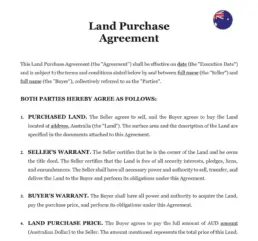Understanding the Legal Process of Buying Land
Purchasing land in Australia can be an excellent investment or a starting point for building your dream home, but it comes with its unique set of challenges and legal requirements. This guide will walk you through the critical steps and considerations when buying land, emphasizing the importance of the land purchase agreement.
Preliminary Research and Planning
Before you start searching for land, it’s essential to conduct thorough research and planning. This stage is crucial for setting realistic expectations and preparing a budget.
1. Market Trends: Stay updated on land prices and market fluctuations. Understand the factors driving the market, such as economic conditions, infrastructure developments, and demographic trends. Utilize resources such as real estate journals, online forums, and local property seminars.
2. Budgeting: Determine your financial capacity, including additional costs like stamp duty, legal fees, surveying fees, and development costs. Create a detailed budget plan that accounts for these expenses.
3. Land Type: Decide whether you want residential, commercial, agricultural, or industrial land. Each type has unique considerations, such as zoning laws, land use restrictions, and development potential.
Choosing the Right Location
Location is one of the most critical factors in buying land. Consider aspects such as accessibility, proximity to amenities, and future growth potential.
1. Accessibility: Ensure the land is easily accessible via roads and public transport. Consider the distance to essential services such as schools, hospitals, and shopping centers.
2. Amenities: Look for nearby amenities like parks, recreational facilities, and community services. These can enhance the value of the land.
3. Growth Potential: Research the area’s development plans and growth prospects. Areas with planned infrastructure projects or economic development initiatives may offer better long-term value.
Legal Due Diligence
Conducting thorough legal due diligence is crucial before making an offer. This involves verifying the land’s legal status, checking for any encumbrances or restrictions, and ensuring compliance with zoning laws and environmental regulations.
1. Title Search: Verify the legal ownership and ensure there are no outstanding claims or liens on the land. This step confirms that the seller has the right to sell the land.
2. Zoning Laws: Ensure the land complies with local zoning regulations and can be used for your intended purpose.Zoning laws dictate how the land can be used, whether for residential, commercial, agricultural, or industrial purposes.
3. Environmental Regulations: Check if the land is subject to any environmental restrictions or protected areas. This includes checking for any contamination, flood zones, or protected wildlife habitats.
Making an Offer
Once you have identified a suitable piece of land and completed your due diligence, the next step is to make an offer. The offer should be made in writing and include the proposed purchase price and any conditions you wish to attach, such as financing approval or satisfactory land survey results.
| ➤ Written Offer: Clearly outline the terms and conditions of your offer. This should include the offer price, deposit amount, settlement date, and any special conditions or contingencies. |
| ➤ Conditions: Include contingencies for financing, inspections, and other critical factors. Common conditions might be obtaining a satisfactory building inspection report, securing financing approval, or selling your current property. |











